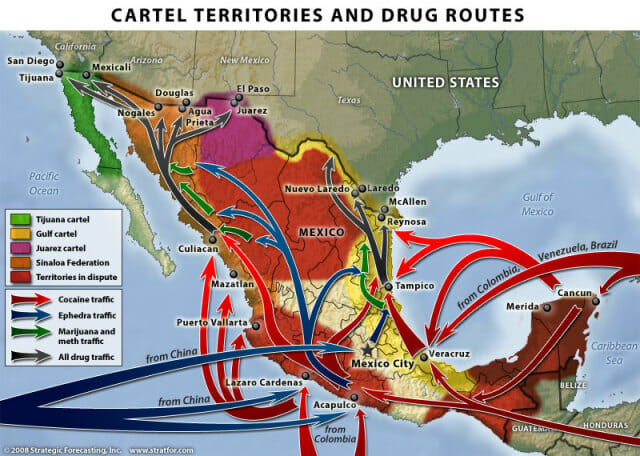
Marijuana legalization has already led to many benefits in the United States, ranging from increased tax revenues to decreasing usage by minors to lowering incarceration rates for non-violent marijuana offenders. But marijuana legalization is also putting a substantial dent into what the Department of Justice calls the “greatest organized crime threat to the United States,” the Mexican drug cartels. And that’s a good thing.
A bit of history on the Mexican drug cartels is in order. Time Magazine reports that, months after coming into office, Richard Nixon ordered the U.S.-Mexican border shut down to cut off the flow of Mexican marijuana coming into the U.S. But as this complete shutdown of border commerce debilitated the Mexican economy, it was clear that this action was also intended to force Mexico to comply with newly established U.S. drug policies, including more policing for marijuana at the border. This increased policing ultimately led to Mexican cartels’ control of land routes into the U.S. Later on in his presidency, in 1971, Nixon declared the U.S. war on drugs. In the 1980s, the Columbian cocaine cartels started using the already developed Mexican drug routes to ensure their cocaine made it to U.S. consumers, and this in turn strengthened and emboldened Mexican drug trafficking. Ronald Reagan further involved the U.S. in Mexican drug affairs via the Anti-Drug Abuse Act of 1986, which mandated that countries that did not adhere to U.S. drug policies would not receive U.S. financial aid.
This constant and intense U.S. pressure on Mexico culminated in what is now being called the “Mexican War on Drugs,” which has been raging in Mexico since 2006. Yet the U.S. remains the number one consumer of Mexican cartel-controlled illegal drugs and approximately 70,000 people have lost their lives at the hands of the cartels. On March 25, 2009, then Secretary of State Hillary Clinton accurately stated that, our “insatiable demand for illegal drugs fuels the drug trade” and that “the United States bears shared responsibility for the drug-fueled violence sweeping Mexico.”
So, what does legalization of cannabis in the United States have to do with helping Mexico eliminate its cartels? If Americans buy their cannabis from state-licensed operations, they are not buying their cannabis from the hardened criminals that make up the drug cartels and that is going to have positive long-term effects for pretty much everyone except the cartels themselves.
A few years ago, our law firm was representing a medical marijuana dispensary against a city that was attempting to shut it down. A city police officer took the stand to explain why this city was so eager to shut down this dispensary. Among the reasons he expressed was a concern about Mexican drug cartels. On cross-examination, one of our cannabis litigation lawyers asked this police officer whether he was aware of any Mexican drug cartel links to medical marijuana in his city or anywhere else in the United States. He answered truthfully with a “no.” We then asked if he was aware of Mexican drug cartel links to illegal drugs in the United States and he, of course, answered with a “yes.” Needless to say, in our closing argument we talked of how having legal marijuana in this city would, if anything, serve to drive out or at least reduce gang influences.
According to Mexican security analyst Alejandro Hope, “approximately 30 percent of cartels’ drug export revenues come from marijuana.” Though on one level marijuana legalization has little effect on the cartels’ ability to smuggle hard drugs like heroin into the United States, just reducing the cartels’ marijuana sales will reduce their power, influence, and wealth and should correspondingly reduce their ability to move heroin and other hard drugs across borders. Standing alone, any reduction in the drug cartels’ power and presence in Mexico and in Columbia would be a great achievement.
We may already be seeing the results in Mexico of marijuana legalization in the United States. Violent crimes are decreasing in Mexico. Homicides hit a high in 2011, with Mexican police departments reporting almost 23,000 murders. Last year, they reported 15,649.
It is both our responsibility and to our benefit to help reduce the drug violence in Mexico and Columbia that we helped to create, and legalizing cannabis is a very good way for us to do that.
Do you agree?























